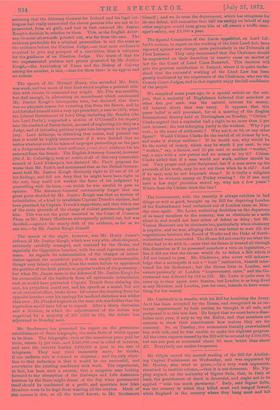The speech of Mr. Mitchell Henry, who seconded Mr. Butt,
was weak, and too much of that kind which implies a personal rela- tion with clients, to command any weight. Mr. Pim was sensible, but dull enough, in advocating an amendment which condemned Mr. Justice Keogh's intemperate tone, bat declared that there was no adequate reason for removing him from the Bench, and he had fortified himself with a very apt precedent, a case in 1834, when the Liberal Government of Lord Grey, including Mr. Stanley (the late Lord Derby), supported a motion of O'Connell's for inquiry into the conduct of Baron Smith, accused of neglecting his duty as a Judge, and of intruding political topics into his speech to the grand jury. Lord Althorpe, in defending that course, had pointed out that it would be highly inconvenient if it were decided that no notice whatever could be taken of improper proceedings on the part of a Judge unless there were sufficient prima facie evidence for his removal from the Bench. The English Attorney-General, however (Sir J. D. Coleridge), took no notice at all of this very reasonable remark of Lord Althorpe's, but declared Mr. Pim's proposal far worse than Mr. Butt's, and maintained that as the British Govern- ment held Mr. Justice Keogh distinctly right in 23 out of 36 of his findings, and did not deny that he might have been right in the rest, they could not weaken the force of his judgment by quarrelling with its form,—on which he was careful to pass no opinion. The Attorney-General conveniently forgot that one great point decided by Mr. Justice Keogh was that no system of intimidation, of a kind to invalidate Captain Trench's election, had been practised by Captain Trench's supporters, and that this is one of the main grounds of the charge of violent partisanship against him. This was not the point remitted to the Court of Common Pleas, as Mr. Henry Matthews subsequently pointed out, but was decided,—against the steady drift of the evidence, as far as we can see,—by Mr. Justice Keogh himself.


































 Previous page
Previous page